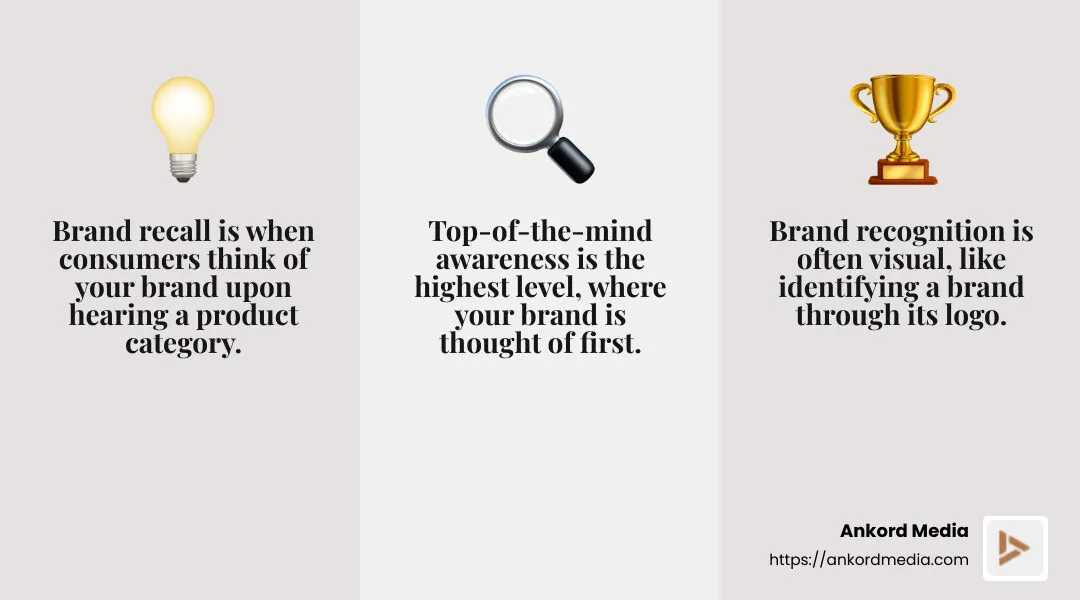
What Is Brand Awareness and Why Does It Matter?
Brand awareness is all about how well consumers can recognize a brand and its products. It's an essential first step in turning potential interest into a tangible relationship with your brand. Here's why brand awareness is crucial:
- Builds Trust: People tend to buy from brands they know and trust.
- Increases Market Share: Familiar brands are often chosen over unknown ones.
- Facilitates Consumer Decision-Making: When people recognize your brand, it can influence their buying decisions positively.
Brand awareness is not just about having a catchy logo and name. It's about the whole experience that forms a person's understanding of and connection to your brand. Think of it as building a reputation—just like getting to know a friend over time.
I'm Milan Kordestani, a passionate entrepreneur and CEO of Ankord Media, where we specialize in elevating brand awareness through strategic design and digital storytelling. Growing up in Silicon Valley, I developed a deep understanding of crafting brand identities that resonate and have successfully applied these insights across multiple ventures.

Understanding Brand Awareness
When we talk about brand awareness, we are diving into how well consumers can remember and recognize a brand. This concept is pivotal in ensuring that your brand stands out in the crowded marketplace. Let's explore the key components: brand recall, brand recognition, and top-of-the-mind awareness.
Brand Recall
Brand recall refers to the ability of consumers to remember a brand when prompted by a product category. For instance, if someone mentions "soft drinks," and you immediately think of Coca-Cola, that's brand recall at work. Advertisers often use jingles or memorable slogans to improve recall. The goal is for your brand to be the first that pops into a consumer's mind when they think of your industry.
Brand Recognition
Brand recognition is slightly different. It's about consumers identifying your brand through visual or auditory cues, such as logos, colors, or even sounds. For example, the moment you see the iconic checkmark, you know it's Nike. This type of awareness is crucial for making a lasting impression and is often measured through aided recall tests, where consumers are given cues to recognize the brand.

Top-of-the-Mind Awareness
Top-of-the-mind awareness is the ultimate goal. It's when your brand is the first one consumers think of without any prompting. Achieving this status means your brand is deeply embedded in consumers' minds, often through consistent exposure and positive experiences. This level of awareness can lead to brand dominance, where your brand is almost synonymous with the product category itself.
In summary, understanding these components of brand awareness helps you tailor your marketing strategies to ensure your brand is not just recognized but also remembered and preferred by consumers. We'll explore why this awareness is vital for building consumer trust and loyalty.
The Importance of Brand Awareness
Brand awareness is more than just getting your name out there. It plays a crucial role in building trust, fostering consumer loyalty, and increasing market share. Let's explore why these aspects are essential for any business.
Trust Building
Consumers are bombarded with choices. They rely heavily on trust to make purchasing decisions. Brand awareness helps establish this trust. When consumers are familiar with your brand, they are more likely to trust it, especially if it consistently delivers on its promises. As Akeeme Hogg notes, "Brand awareness creates a community that generates word of mouth buzz." This buzz builds trust, and trust leads to long-term relationships with customers.
Consumer Loyalty
Consumer loyalty is the holy grail for any brand. It means customers keep coming back to you, often without considering alternatives. High brand awareness is the foundation of this loyalty. When people recognize and trust your brand, they are more likely to become loyal customers. This loyalty not only results in repeat purchases but also turns customers into brand advocates. They recommend your brand to friends and family, creating a ripple effect that improves your brand's visibility and reputation.
Market Share
Increasing your market share is a key goal for any business. Brand awareness is a powerful tool to achieve this. When consumers consistently recognize and recall your brand, you gain a competitive edge. Your brand becomes the go-to choice in its category. This familiarity can lead to a higher market share as consumers prefer your brand over others. Brands with high awareness often become synonymous with their products, like how people ask for a "Kleenex" instead of a tissue.

In conclusion, brand awareness is not just about visibility. It's about creating a trusted and loyal customer base and capturing a larger market share. As we explore strategies to improve brand awareness, keep in mind these benefits that can propel your business to new heights.
Strategies to Improve Brand Awareness
Building brand awareness is essential for businesses looking to stand out in a crowded marketplace. Here are some effective strategies to improve your brand's presence:
Social Media
Social media is a powerful tool for boosting brand awareness. Platforms like Instagram, Facebook, and X (formerly Twitter) offer opportunities to engage with audiences in a personal and interactive way. Consistent posting, engaging content, and active community management can significantly increase your brand's visibility.
Consider using a mix of content types, such as videos, infographics, and stories, to keep your audience engaged. Partnering with influencers who resonate with your target audience can also amplify your reach. According to the 2024 Influencer Marketing Report, nearly half of consumers trust influencers as much as they did six months ago, making influencer collaborations a promising avenue.
Storytelling
Storytelling is a compelling way to connect with your audience on a deeper level. Crafting a narrative around your brand humanizes it and makes it relatable. Whether it's the story of your brand's inception, a behind-the-scenes look at your processes, or customer success stories, authentic storytelling creates emotional connections.
As noted in the research, storytelling should be truthful and beneficial to all concerned. This authenticity can lead to an enormous boost in brand awareness as people are more likely to remember and share stories that resonate with them.
Partnerships
Partnerships, or co-marketing, involve collaborating with another brand to reach a wider audience. By working together, both brands can leverage each other's strengths and audiences. For example, a company selling dog leashes might partner with a dog-walking app to create a shared offer. This not only amplifies reach but also highlights what each brand offers in the marketplace.
Events
Events are an excellent way to engage with your audience in person or virtually. Hosting your own events or participating in industry-related ones can increase your brand awareness. Experiential events, where attendees can interact with your brand in unique ways, often leave a lasting impression.
For instance, a brand activation event can generate buzz and excitement, especially if coupled with media coverage or influencer participation. These events provide opportunities for direct engagement, making your brand more memorable.
Content Marketing
Content marketing involves creating valuable content that resonates with your audience. This could be blog posts, videos, podcasts, or infographics. The key is to produce content that is informative, entertaining, and shareable.
Repurposing content across different platforms ensures you reach a broader audience while maintaining consistent messaging. This strategy not only increases brand awareness but also positions your brand as a thought leader in your industry.
By implementing these strategies, you can effectively improve your brand awareness and establish a strong presence in the market. Next, we'll explore how to measure the success of these efforts.
Measuring Brand Awareness
Once you've implemented strategies to boost brand awareness, it's crucial to measure their effectiveness. Here are three key methods to gauge how well your brand is resonating with your audience:
Brand Surveys
Brand surveys are a direct way to understand how people perceive your brand. They can measure both unaided and aided awareness.
- Unaided awareness is assessed by asking questions like, "What brands come to mind when you think of toothpaste?" This helps identify if your brand is top-of-mind.
- Aided awareness involves showing a list of brands and asking respondents which ones they recognize. This can help determine if people are familiar with your brand when prompted.
These surveys provide valuable insights into brand perception and can guide future marketing efforts. However, they can be time-consuming to design and analyze, so consider using them alongside other methods for a more comprehensive understanding.
Web Traffic
Tracking web traffic is another effective way to measure brand awareness. When more people are visiting your website, it indicates that your marketing efforts are working.
- Direct traffic is a key indicator, as it shows how many people are typing your URL directly into their browser. This suggests they are already aware of your brand.
- Using tools like Google Analytics, you can also track overall site traffic and see where visitors are coming from—be it organic search, social media, or referrals.
Monitoring these metrics over time can show trends in awareness and help you understand which strategies are driving the most interest.
Social Listening
Social listening involves monitoring social media platforms to understand how people are talking about your brand. This can provide real-time insights into brand awareness and sentiment.
- Tools like Sprout Social can track total message volume to see how often your brand is mentioned.
- A sentiment summary can reveal whether the conversations about your brand are positive, negative, or neutral.
- Share of voice compares your brand's presence on social media to competitors, helping you understand your position in the market.
Social listening not only measures awareness but also highlights areas for improvement and opportunities for engagement.
By using these methods, you can effectively measure brand awareness and refine your strategies for even greater impact. Next, we'll address some frequently asked questions about brand awareness to further clarify its importance and implementation.
Frequently Asked Questions about Brand Awareness
What are the types of brand awareness?
Brand awareness comes in different forms, each playing a unique role in how consumers perceive and remember your brand.
- Brand Recall: This is when consumers can remember your brand without any help. For example, if someone thinks of running shoes and immediately says "Nike," that's brand recall. It's about being the first brand that comes to mind.
- Brand Recognition: This occurs when consumers can identify your brand from a list or when they see your logo. It's like recognizing the McDonald's golden arches or the bitten apple of Apple. Recognition doesn't always mean recall, but it shows familiarity.
- Top-of-the-Mind Awareness: This is the ultimate goal. It means your brand is the first one people think of when they need a product or service in your category. It's the highest level of brand recall and indicates strong consumer connection.
How can I increase brand awareness?
Increasing brand awareness involves various strategies. Here are some effective ones:
- Creative Campaigns: Unique and memorable campaigns can make your brand stand out. Think of Volvo Trucks' "Epic Split" campaign with Jean Claude Van Damme, which highlighted the brand's reliability and precision.
- Social Engagement: Engaging with your audience on social media can boost awareness. Responding to comments, sharing user-generated content, and running interactive campaigns can make your brand more relatable and visible.
- Consistent Messaging: Consistency in how you present your brand across all platforms builds trust and recognition. Use the same colors, logos, and tone of voice to create a cohesive brand image.
Why does brand awareness matter?
Brand awareness is crucial for several reasons:
- Consumer Trust: When people recognize and are familiar with your brand, they're more likely to trust it. Trust leads to loyalty and repeat purchases.
- Brand Equity: High awareness can improve your brand's value, making it more attractive to both consumers and investors. It can be a significant asset in your business's overall worth.
- Competitive Edge: Brands with strong awareness often have a competitive advantage. They're more likely to be chosen over lesser-known brands, even if the products are similar.
Understanding and leveraging these aspects of brand awareness can significantly impact your business's success. Next, we'll explore how Ankord Media can help you develop a strategic branding approach that improves your market presence.
Conclusion
At Ankord Media, we understand that brand awareness is not just about being seen—it's about being remembered and trusted. Our approach to strategic branding and impactful storytelling sets us apart in the industry. We partner with visionary clients to transform bold ideas into tangible success, focusing on authentic customer connections.
Strategic Branding: Our strategic branding services aim to create a distinct and memorable brand identity. We employ a blend of cutting-edge design and technology to craft digital experiences that resonate with your audience. By aligning your brand with your core values and customer expectations, we ensure you stand out in a crowded marketplace.
Impactful Storytelling: Storytelling is at the heart of what we do. We believe that every brand has a unique story to tell, and we help you communicate that story effectively. Whether it's through engaging content, compelling narratives, or immersive digital experiences, we make sure your brand's voice is heard loud and clear.
In today's digital world, having a strong brand awareness strategy is crucial. It builds trust, fosters consumer loyalty, and secures your market share. With Ankord Media by your side, you can be confident that your brand will not only meet but exceed expectations.
Ready to lift your brand? Learn more about our services and find how we can help you achieve your branding goals.


